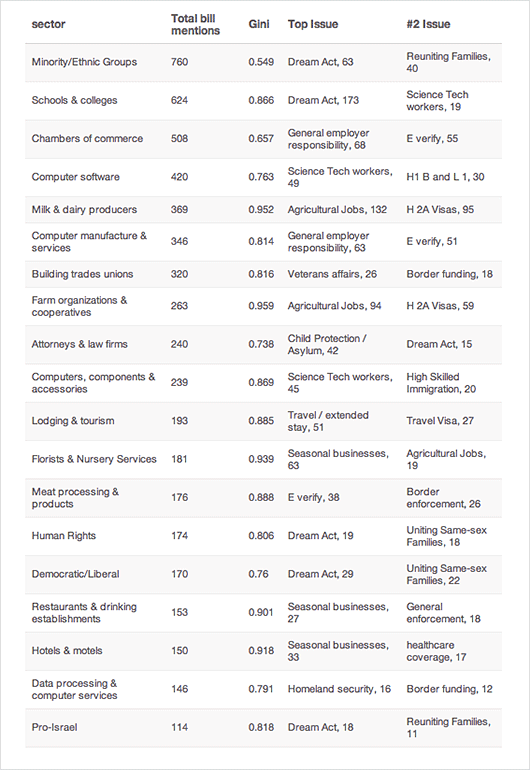Results 1 to 1 of 1
Thread Information
Users Browsing this Thread
There are currently 1 users browsing this thread. (0 members and 1 guests)
-
03-26-2013, 06:36 PM #1
Our Massively One-Sided Immigration Debate
Our Massively One-Sided Immigration Debate
Published: Tuesday, 26 Mar 2013 | 3:48 PM ET
By: John CarneySenior Editor, CNBC.com
With Congress once again slouching toward immigration reform, it makes sense to look for who is lobbying lawmakers to shape the coming legislation.
As it turns out, while Americans remain divided on immigration, the lobbyists are not.
The Sunlight Foundation, a do-gooder government transparency and accountability outfit formed in 2006, on Monday released "Untangling the Webs of immigration Lobbying," a report examining the organizations that have led the charge for changing the rules on immigration to the United States.
Sunlight dug through 8,000 lobbying reports filed since the last big push for immigration reform in 2007. Six-thousand seven-hundred and twelve of those involved immigration lobbying. More than $1.5 billion was spent on this immense lobbying push.
The report lists which business sectors were the most active lobbyists. The chart here lists the sector, the total of immigration related bills lobbied upon, and the top two issues. Click here for more explanation of the chart from Sunlight.

Notice anything odd about that list? All but one of these interest groups are supporters of looser immigration rules in one way or another. This is quite obvious for some of them. You know that the computer software sector isn't lobbying for fewer high-tech workers, just like the agricultural sector isn't lobbying for fewer farm laborers.
So although the meat processing & products sector is listed as primarily being concerned with E-verify—an internet based free program that detects whether a new hire is authorized for employment—and border enforcement, that doesn't mean that Tyson Foods—the biggest donor in this category—is asking the government to crack down on the border. It means Tyson supports "comprehensive immigration reform" that would open the borders to more workers for Tyson's plants and legalize workers already here.
Some are less obvious. Take the Chamber of Commerce, for example. The biggest issues for the Chamber are listed as "general employer responsibility" and "E-verify." But the Chamber is actually strongly in favor of an immigration policy that permits more high skill and more low skill immigration.
How about the "Data Processing & Computer Sector" sector? Its primary immigration related lobbying efforts are around the subjects of "homeland security" and "border funding." No doubt some of this is pure profit motive: these companies want to make sure that the government spends plenty on technology related to immigration. But that doesn't mean they want to actually shrink the number of immigrants. In fact, the biggest donor in this category is EMC Corp. Here's the EMC executive vice president for Human Relations opining on the need for more high-skilled immigrants.
The only group not favoring increasing immigration in one category or another—or all of them—is probably the building trade unions. Even the builders, however, are not actually restrictionists in the sense of wanting to shrink the number of immigrants. They are mostly lobbying to oppose reforms designed to loosen the requirements for H2B visas, which they fear will hurt their members wages.
This is very revealing. Despite all the press that immigration restriction and border enforcement efforts garner, when it comes to lobbying, those saying we need to pare back immigration are getting completely clobbered. They don't even rank in the top twenty.
Yet when Americans are asked about raising or lowering the number of immigrants coming into the country, only a small portion favor higher immigration levels and a very sizable plurality favor lower levels. A 2006 study by the Pew Hispanic Center, for example, found that 40 percent of those surveyed said legal immigration should be reduced and just 17 percent favored an increase. (Apparently Pew stopped asking that particular question after 2006.)
This chart from Pew shows that as recently as 2012, 69 percent of those surveyed agree that "we should restrict and control people coming to live in our country more than we do now."
Americans are divided over immigration. The lobbyists in Washington? Not so much.
Our Massively One-Sided Immigration Debate


 LinkBack URL
LinkBack URL About LinkBacks
About LinkBacks




 Reply With Quote
Reply With Quote


"YOU WILL FOOT THE BILL FOR ILLEGAL IMMIGRANTS!" GOVERNOR HOCHUL...
04-23-2024, 05:46 AM in Videos about Illegal Immigration, refugee programs, globalism, & socialism